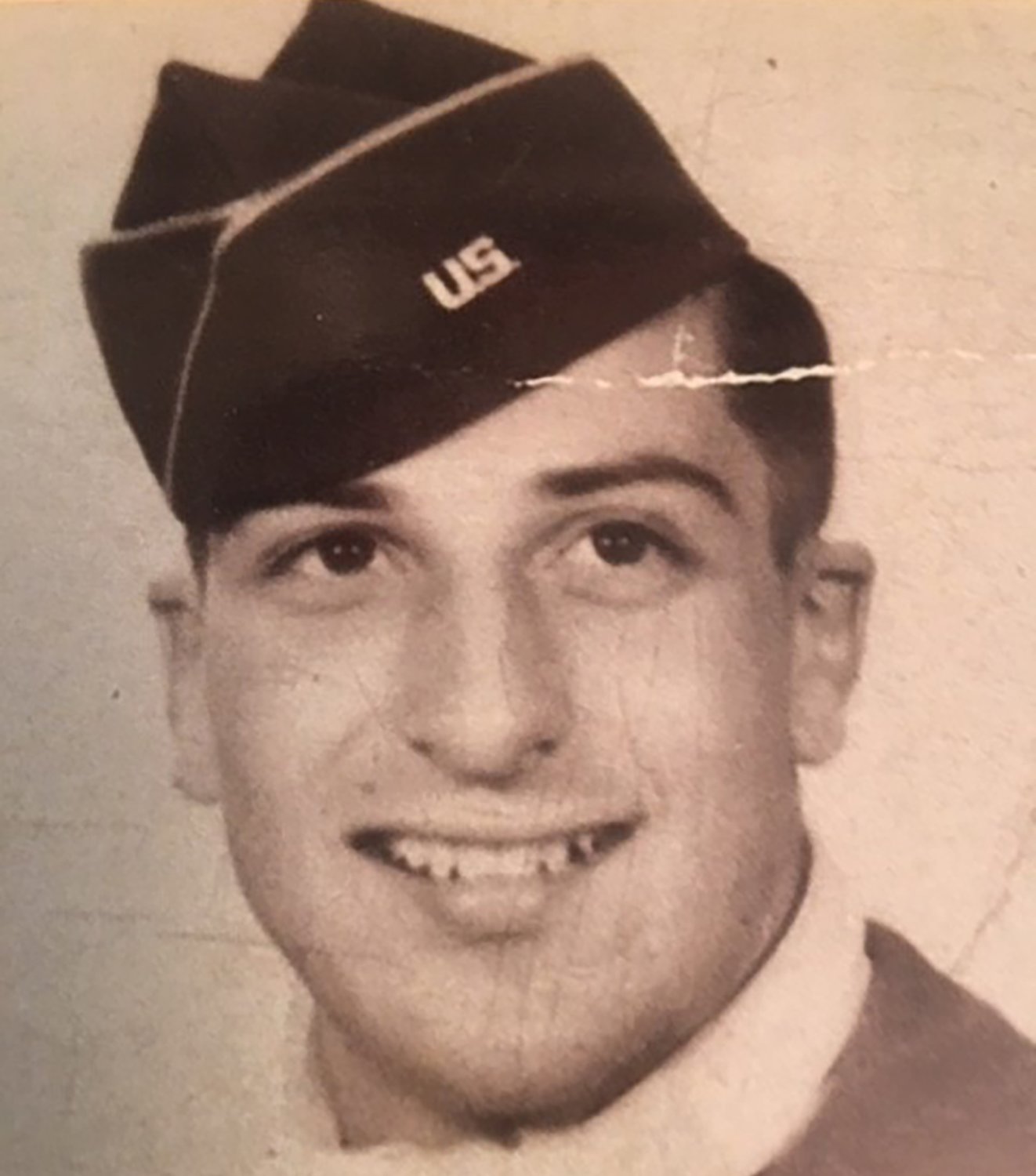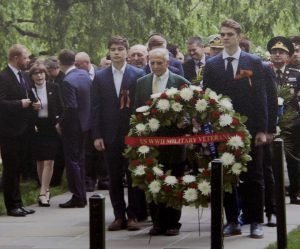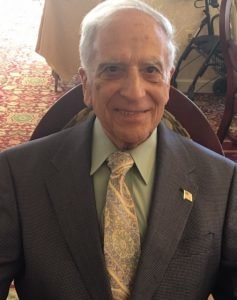
Frank Cohn, now a 95-year-old retired Army colonel, is seen pictured in a photo during World War II. While deployed, Cohn served as an intelligence officer and a German translator. Photo courtesy of Frank Cohn
By Thomas Brading, Army News Service
ALEXANDRIA, Va. — When Frank Cohn, a 95-year-old retired Army colonel, first enlisted in 1943, he had already fled Nazi Germany after being targeted by the Gestapo.
Looking back on the events that followed — from his arrival to America seeking refuge from the Nazis to the twist of fate that led to an Army career fighting those oppressors, the colonel said he had no regrets.
A founding member of the Joint Base Myer-Henderson Hall Retiree Council, Cohn has spent decades staying connected with local veterans.
“When I’m involved with something, I stay involved,” he said. “I had a 35-year military career, and I wasn’t just going to break that off. I wanted to stay in touch.”
On Sept. 29, Cohn is slated to receive one of the top military police honors — the Order of the Marechaussee — in his hometown of Alexandria, Virginia, from the Military Police Regimental Association.
Life in Nazi Germany
For years, Cohn lived in a comfortable, middle-class German family in Breslau. He enjoyed collecting stamps, playing soccer, and being outside. In other words, he was an average young boy — but the world was quickly changing around him.
In Berlin, Nazi leadership — led by Adolf Hitler — gradually slid the country from a democracy to a dictatorship. The Nazi control vividly came to Breslau at the outset of his third grade year, he said.
Frank’s teacher, who he said “was very nice” the previous year, arrived in a Nazi uniform. His classmates were indoctrinated as Hitler Youth, which fueled the Third Reich’s ideology.
This “scared the hell out of” him, he said.
To avoid the growing anti-Semitism in public schools, the Cohn family transferred their son to a private school for Jewish children, where he stayed until middle school. At the private school, things seemed to go relatively well for him, despite the community’s rising hostilities toward the Jewish community.
Cohn’s dad owned a sporting goods store, but “the minute Hitler came into power, uniformed Nazis picketed the store with signs that said, ‘Don’t buy from Jews,’” Cohn said. In 1938, Frank’s dad sold their family business, and he came to the United States on an immigrant visa. His dad left to find a way to bring his whole family to the states.
Around this time, the Gestapo arrived at his home with an arrest warrant for his father. That was the last straw. Frank and his mom couldn’t wait any longer, he said.
They escaped from Germany into Holland, and both had a suitcase and 10 deutsche marks each when they came to the United States on an excursion trip visa, after his mother bribed an official at the consulate.

Refuge in Roosevelt’s America
At age 13, Frank arrived in New York City on Oct. 30, 1938, a few days before Kristallnacht, or “Night of the Broken Glass,” on Nov. 9, when paramilitary Nazis violently ransacked Jewish homes, hospitals, and schools throughout Nazi-occupied Europe. The attack resulted in at least 90 deaths, 1,000 synagogues burned, more than 7,000 Jewish businesses destroyed, and more than 30,000 people put into Nazi concentration camps.
Because of Kristallnacht, President Franklin D. Roosevelt issued an executive order that “anyone in the United States would not be sent back,” Cohn said. “That’s what saved us.”
The Cohn family were first-class passengers on the boat bound for America. The first-class ticket worked in their favor, he said, and not just because of the accommodations. Instead, they were able to get off the boat without going through Ellis Island with other passengers, where they would have likely been rejected entry because Frank’s dad was already in the United States.
This was due to the Immigration Act of 1924, which limited the number of visas available every year, which left thousands of German Jews on long waiting lists to come into the United States.
However, it all worked out for Frank and in no time he was a full-fledged New Yorker, a place often viewed as the land of immigrants. Things weren’t perfect, but at least the Cohn family reunited under one roof, in their new country.
Cohn attended Stuyvesant High School, and although the German teen couldn’t speak a lick of English upon arrival, he said, “It all worked out OK.” Over the years, he slowly picked up the language by listening to the radio and watching American films. To this day, his favorite is still the 1939 classic “Gone with the Wind” starring Vivian Leigh and Clark Gable.
In America, he was considered “an enemy alien,” but that also meant he didn’t have to go back to Germany — until he was drafted by the Army shortly after his 18th birthday in 1943. He had no issue going to war against a homeland that declared him stateless.
Refugee turned liberator
At first, Cohn refused to speak German. In fact, he separated himself from all things German.
During basic training, he was taken to the U.S. District Court in Columbus, Georgia, where he was sworn in as an American citizen. He was initially assigned to the 87th Infantry Division, but then became an infantry replacement and was sent through England and France to Belgium, all the way to the front line.
While in Belgium, Army officials learned German was his native tongue. The 19-year-old was plucked from the infantry ranks and quickly sent to Le Vesinet near Paris to take a weeklong course before becoming an intelligence agent assigned to the 12th Army Group.
As an intelligence agent, the young Soldier traveled with a small team, village by village through Europe, and interrogated Nazis.
“When I left Germany, I was a victim,” he said. “When I came back, I was in charge. Whenever we captured Germans, [my job was] to communicate with them. For that reason, it felt pretty good to be back in Germany. Now, if I would have gotten captured, that’d be a different story.”
During the war, Cohn was part of the Battle of the Bulge, Germany’s last major offensive attack on the Western Front during the war. “It was the scariest day of my life,” he said.

‘Vat goes on here!’
During the Battle of the Bulge, Cohn and three other Soldiers drove around Belgium to interrogate German prisoners of war. While on patrol in Belgium, their captain had them drive aimlessly down various routes, then turn onto side streets, and “somewhere along the way, we could see the captain didn’t know where he was going,” he recalled.
“He was looking around, then looking at the map,” Cohn said. “We were lost.”
Although they didn’t spot any enemies, they did come across another deployed unit on a nearby hillside. Their captain said to Cohn, “Let’s stop here and see where we are. Come on with me.” Cohn had a feeling the American troops wouldn’t be welcoming to a small group of Soldiers with German accents, regardless of the uniform they were wearing. He was right.
Cohn and his captain were met by a young American lieutenant, who looked them up and down, then asked for their identification cards.
“We didn’t have any [ID cards],” Cohn said. “My captain explained that we were in intel, and we couldn’t carry IDs in case we were captured. We showed [the lieutenant] our dog tags, but he said anyone can have dog tags.”
The lieutenant stared at them. “We got word some [Germans] are running around here in American uniforms, and you guys look like it,” the lieutenant said to Cohn’s captain. “Can you tell me the sixth general order?” It was a loyalty test.
Unfortunately, the captain didn’t have a clue. The lieutenant gave them another chance, “Can you tell me who won the World Series?” Again, the captain didn’t have a clue but this time looked at Cohn, who shrugged. Strike two.
Last chance. “Alright,” the lieutenant said. “Sing to me the Star Spangled Banner.” Cohn’s captain started singing, in the freezing cold, to the hillside Soldiers but halfway through, forgot the words.
“By now, another interpreter in the jeep could see more [Soldiers] coming up to us [at gun point] to see what was going on, so he got out and came toward us, too,” Cohn recalled, and in a thick-German accent started yelling, “Vat goes on here! Vat goes on here!”
And that was all it took, he said. The group was officially mistaken as enemy forces and detained. Fortunately, “seven hours later we were able to ascertain we were legitimate, and that lieutenant said he never wanted to see us again,” Cohn said.

After the war
In 1946, then-Staff Sgt. Cohn left active duty. He missed the Army, so while in college, he joined the Army Reserve. After graduating from the City College of New York, Cohn commissioned as a second lieutenant in the Regular Army as a military police officer, and never looked back.
He retired as a colonel in 1978. During his career, he deployed to Korea, Vietnam, and three trips back to Germany. His last assignment was chief of staff for the Military District of Washington, where he still calls home.
During his career, Cohn received multiple awards and recognitions, such as being inducted into the Military Police Hall of Fame in 2004 and named Mount Vernon District Citizen of the Year and Lord Fairfax in 2008. He was also invited to Moscow, Russia, three times for the anniversaries of the U.S.-Soviet meeting at the Elbe; and received multiple medals including the French Chevalier Legion of Honor and the German Grand Service Cross — despite never acknowledging his heritage to the Germans.
And then there’s his next award, the Order of the Marechaussee. Another reminder of his years of service.
The importance of that service, and Cohn’s firsthand accounts during World War II, may have been lost in the annals of time had it initially gone his way. “I never talked about it,” he said, after returning from the war. “Nobody talked about it. We were all happy it was over and finished.”
Editor’s note: For more information on how to livestream Cohn’s ceremony next week, please visit the U.S. Army Office of the Provost Marshal General’s official Facebook page.

Since 1943, ARNEWS has been the Army's premier print wire service with the daily mission of telling the service's story to its internal audiences worldwide. The general public is also a tertiary audience that can now view articles on Army.mil. But the target audience remains the 6 million Soldiers, Family members, retirees, reserve-component troops, civilian employees and contractors worldwide who traditionally read the stories in their command newspapers.
BRCC and Bad Moon Print Press team up for an exclusive, limited-edition T-shirt design!
BRCC partners with Team Room Design for an exclusive T-shirt release!
Thirty Seconds Out has partnered with BRCC for an exclusive shirt design invoking the God of Winter.
Lucas O'Hara of Grizzly Forge has teamed up with BRCC for a badass, exclusive Shirt Club T-shirt design featuring his most popular knife and tiomahawk.
Coffee or Die sits down with one of the graphic designers behind Black Rifle Coffee's signature look and vibe.
Biden will award the Medal of Honor to a Vietnam War Army helicopter pilot who risked his life to save a reconnaissance team from almost certain death.
Ever wonder how much Jack Mandaville would f*ck sh*t up if he went back in time? The American Revolution didn't even see him coming.
A nearly 200-year-old West Point time capsule that at first appeared to yield little more than dust contains hidden treasure, the US Military Academy said.












